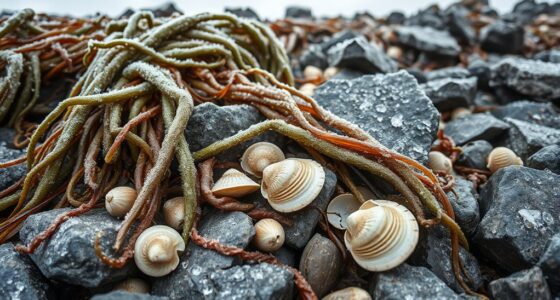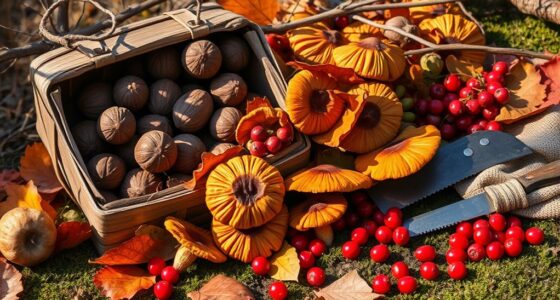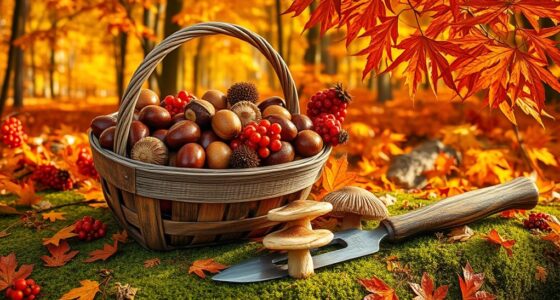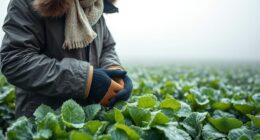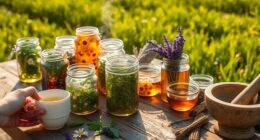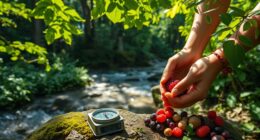When foraging in city parks during winter, it’s essential to only pick safe, native plants you can confidently identify, like winter greens or wild herbs. Always harvest responsibly by taking only what you need, using scissors rather than uprooting whole plants, and leaving enough behind for the ecosystem to thrive. Follow park rules and avoid contaminated areas to stay safe. Keep these principles in mind, and you’ll discover more ways to forage ethically and sustainably.
Key Takeaways
- Identify native, edible winter plants that are safe and sustainable to harvest, avoiding invasive or protected species.
- Use minimal, non-destructive harvesting methods like snipping and only take what is needed.
- Follow park rules and seek permission, respecting designated foraging areas and local regulations.
- Avoid plants in polluted areas, and always wash foraged greens thoroughly before eating.
- Practice environmental stewardship by leaving plenty of plants behind and supporting healthy urban ecosystems.

As winter settles over the city, many people overlook the opportunity to forage for wild edibles amidst urban landscapes. You might think the cold months bring a halt to foraging, but the truth is, winter reveals a different side of urban foraging—one that’s filled with hidden treasures and opportunities for liberation from commercial food sources. The key is knowing what’s ethical to pick in parks, ensuring you respect the environment while nourishing yourself. Ethical harvesting isn’t just about legality; it’s about honoring the plants and ecosystems that sustain us. When you venture into city parks, you’re entering a shared space that demands responsibility and mindfulness.
Start with understanding which plants are safe to harvest during winter. Many native herbs and greens, like winter greens or certain wild herbs, can be foraged without damaging the environment, provided you follow sustainable practices. You want to avoid overharvesting, which not only depletes local populations but also disrupts ecological balance. Pick only what you need, leaving plenty behind to continue thriving. Use scissors or pruning tools rather than uprooting entire plants—this preserves their ability to regenerate and keeps the ecosystem healthy. Remember, your aim is to gather enough to enjoy and nourish yourself, not to wipe out patches of nature.
Identify safe winter plants, harvest sustainably, and avoid overharvesting to protect urban ecosystems.
Respect park rules and local regulations. Many urban parks have guidelines about foraging, and ignoring them can harm your cause of ethical harvesting. If in doubt, seek permission or look for designated areas where foraging is permitted. Sometimes, parks have community programs or volunteer days focused on sustainable harvesting—these are excellent opportunities to learn and participate responsibly. Be discreet and considerate, so your foraging doesn’t draw unwanted attention or cause conflicts with other park users. Your goal is to integrate into the environment seamlessly, acting as a steward rather than a disruptor.
As you forage, stay aware of your surroundings. Avoid plants that might be contaminated with pollutants, pesticides, or dog waste. Wash everything thoroughly before consumption. Remember, you’re reclaiming your food source, but it’s vital to do so ethically and safely. Urban foraging offers a form of liberation—breaking free from reliance on grocery stores and reconnecting with nature’s cycles. Additionally, understanding which plants are safe to harvest during winter can help you make informed choices and prevent harm to the environment and promote sustainable foraging. By practicing ethical harvesting, you’re not just gathering wild edibles; you’re championing a conscious, sustainable way of living within the city’s concrete jungle. Embrace the adventure with respect and responsibility, and you’ll find that winter’s urban landscape is brimming with nourishment and resilience.
Frequently Asked Questions
Are There Any Legal Restrictions on Foraging in City Parks?
You should check the plant legality and park regulations before foraging in city parks. Many parks have strict rules against removing plants to protect local ecosystems, so breaking these laws can get you fined or banned. Even if it’s tempting to gather wild edibles, respect the rules to keep your foraging adventures sustainable and legal. Always research specific park policies and follow local laws to enjoy your foraging freedom responsibly.
How Can I Identify Edible Versus Toxic Plants Safely?
Think you’re a plant Sherlock? Start with solid plant identification skills and always double-check sources—don’t rely on guesswork or social media. Toxin awareness is your best defense; remember, one wrong nibble can turn a foraging adventure into a trip to the ER. Be vigilant, stay educated, and trust your instincts—liberate yourself from risky botanical mistakes and enjoy foraging safely, like the wild expert you’re meant to be.
What Tools or Equipment Are Necessary for City Winter Foraging?
You’ll need essential foraging gear like a sturdy knife, scissors, and a basket or mesh bag to collect your finds. Wear warm winter clothing—layer up with waterproof jackets, gloves, and boots—to stay comfortable and safe. A field guide or plant identification app can help verify your harvests quickly. With the right tools and gear, you can confidently explore the city’s winter bounty, feeling liberated and connected to nature even in cold months.
How Do I Ensure Sustainable Harvesting Practices?
To guarantee sustainable harvesting, you actively respect plant populations by only taking what you need and leaving enough behind for regeneration. Practice ethical foraging by identifying plants correctly and avoiding overharvesting vulnerable species. Be mindful of park rules and local regulations, and never damage the environment. By consciously applying sustainable harvesting techniques, you support healthy ecosystems and enjoy foraging as a liberating, responsible activity that benefits both nature and yourself.
Are There Community Groups or Workshops for Urban Foragers?
You’ll find many urban foraging community workshops in your city, offering hands-on guidance and connecting you with fellow foragers. Did you know that over 60% of city dwellers are interested in sustainable foraging? These workshops empower you to forage responsibly, respecting nature and local regulations. Joining such groups not only boosts your knowledge but also helps you embrace your freedom to gather wild edibles ethically and confidently.
Conclusion
As winter’s grip tightens on the city’s parks, remember that foraging is like tending a delicate garden—you must nurture it carefully. By choosing only what’s ethical and sustainable, you’re helping keep this urban wilderness alive and thriving. Think of yourself as a steward, not a thief, honoring the balance between nature and city life. When you forage responsibly, you become part of a living mosaic, ensuring these green treasures endure for generations to come.



